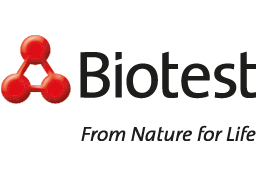Immunoglobulins (antibodies) are vitally important proteins which circulate in the blood and perform a wide variety of tasks. They influence markedly the balance of our immune system.
The predominant type of antibody in human blood is immunoglobulin G (IgG). The most important tasks are to neutralize and eliminate viruses and bacteria that enter the body, products of bacterial metabolism (toxins) and substances which are formed during inflammation in the body or when cells are destroyed.
On account of its structure, IgG is capable of binding to receptors (binding sites) on the surface of blood cells or to certain organ cells and of influencing the behavior of these cells. Cell proliferation and maturation, as well as the activity of cells of our immune system, are regulated in this way.
By binding to cells, immunoglobulins have an influence on the control of inflammatory processes, on the regeneration of destroyed tissues after injuries or surgical operations and also on the maintenance of organ functions. They are important for communication between our immune system and our nervous system, for the coagulation and for the system of blood vessels.
Antibody concentrates as therapeutic agents
Immunoglobulin preparations in the form of antibody concentrates are used for the treatment of patients with a congenital (primary) or acquired antibody deficiencies, as well as for patients with autoimmune diseases.
In comparison with blood, these preparations contain five or ten times the quantity of IgG antibodies per milliliter of liquid. In this way, many millions of antibodies can be administered within a short time when required to support the body’s immune defense, to inhibit inflammatory processes and to support tissue regeneration.
The preparations are obtained from human blood plasma, are virus-inactivated, purified of unwanted secondary substances and concentrated. The collection of the plasma and also the production of immunoglobulin preparations are subject to stringent national and international guidelines.


